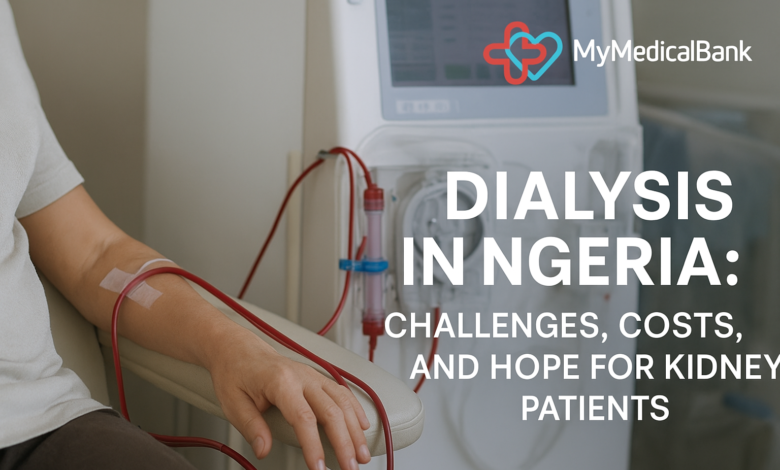Dialysis in Nigeria: Challenges, Costs, and Hope for Kidney Patients

When the kidneys stop working the way they should, the body struggles to get rid of waste and extra fluid. This is where Dialysis comes in.
Dialysis is a life-saving treatment that acts like an artificial kidney, cleaning the blood and helping the body stay balanced. The process can be done in different places , a hospital, a dialysis center, or even at home, depending on the patient’s health and the resources available.
For people living with stage 5 chronic kidney disease (CKD), also called kidney failure or end-stage renal disease (ESRD), dialysis often becomes a must. Without it or a kidney transplant, survival beyond a few weeks or months would be almost impossible.
Dialysis may not cure kidney disease, but it gives patients a chance to live longer, healthier, and more fulfilling lives while waiting for a transplant or managing their condition long-term.
Dialysis is basically a backup system for your kidneys. It steps in to:
- Remove waste and toxins from your blood.
- Balance your body’s fluids to prevent high blood pressure and swelling.
- Regulate electrolytes like sodium and potassium, which are super important for your heart.
- Support your metabolism, helping you avoid hospital visits.
Chronic Kidney Disease: Why It’s a Growing Concern in Nigeria
Chronic Kidney Disease (CKD) is one of those health issues that doesn’t always get enough attention, yet its impact is massive. Sadly, the number of people dealing with it continues to rise every year, especially in developing countries like Nigeria.
A study at the University of Nigeria Teaching Hospital (UNTH), Enugu, gives us a clear picture of how serious the problem is. Researchers looked at patients with End-Stage Renal Disease (ESRD), the most advanced stage of kidney failure, over a 13-year period (from May 1990 to December 2003).
The findings were eye-opening:
- 1,538 patients were reviewed (1,001 men and 537 women).
- Out of these, 908 patients (593 men and 315 women) had to undergo haemodialysis, which is a life-saving procedure that filters waste from the blood when the kidneys can’t.
- The average age of the patients was around 42 years, and most (about 87%) were below 60 years old.
One of the biggest challenges was figuring out the root cause of kidney failure. In more than half of the cases (51.6%), the cause couldn’t even be identified. However, hypertension (high blood pressure) and glomerulonephritis (a type of kidney inflammation) were the leading causes in the cases where doctors could determine the problem.
Perhaps the most heartbreaking part of the study is that deaths from kidney disease made up over 22% of all medical deaths in that hospital during the period studied.
This shows how critical it is to raise awareness about kidney health in Nigeria. Preventive care, early diagnosis, and affordable access to treatments like dialysis can make a huge difference. Without that, many young and middle-aged people, people still in the prime of their lives, will continue to face the heavy burden of Chronic Kidney Disease.
The Realities of Dialysis: What Patients Go Through
Dialysis is a life-saving treatment, but beyond the hospital visits and machines, there are a lot of day-to-day challenges that many patients face. While dialysis helps keep people with kidney failure alive, it also comes with its own set of struggles that can affect almost every part of life.
Uncomfortable Side Effects
One of the biggest hurdles for people on dialysis is dealing with the side effects. Things like fatigue, dizziness, low blood pressure, muscle cramps, and nausea are very common. Some patients also experience trouble sleeping and even a loss of sex drive. These side effects might not sound too serious at first, but when they keep happening week after week, they can really interfere with daily activities. That’s why it’s so important for patients to keep talking to their doctors if these issues start to feel overwhelming.
Weakened Immune System
Dialysis patients also often struggle with a weaker immune system. That means they’re more vulnerable to illnesses, which can be especially stressful in times like the COVID-19 pandemic. Taking simple precautions like wearing a mask in crowded places, getting vaccines, and practicing good hygiene can go a long way. Still, it can be scary knowing your body isn’t as strong at fighting infections as it used to be.
Juggling Appointments
Another reality is the endless doctor visits and treatment schedules. Even patients who do home dialysis have to carefully set aside hours multiple times a week for treatment. This can be exhausting and sometimes hard to balance with school, work, or family responsibilities. The good news is that options like home hemodialysis or peritoneal dialysis can provide a little more flexibility and independence, making the process slightly easier to handle.
The Financial Burden
Medical bills are another heavy burden. Between frequent treatments, prescriptions, and specialist appointments, the costs can pile up quickly. For people who can’t work as much because of their treatment schedule, the stress is even worse. In some hospitals across Nigeria, dialysis has been subsidized to make it more affordable, but many patients still find it hard to cope. Social workers and health programs can sometimes connect patients with resources to ease the financial strain.
Dietary Restrictions
On top of everything else, dialysis often comes with strict food and fluid restrictions. Patients may have to give up some of their favorite meals and be very careful about what they drink. This can feel frustrating and isolating, especially in cultures where food is such an important part of family and social life. Working with a dietician can help make meal planning a bit more manageable and maybe even enjoyable.
Limited Access to Dialysis Centers
In Nigeria and many other countries, limited access to dialysis centers is another huge challenge. Some patients have to travel long distances several times a week just to get treatment, which can be exhausting and expensive.
Dialysis Subsidy in Nigeria: A Lifeline for Kidney Patients
Kidney diseases are one of the leading health challenges in Nigeria today, and for many patients, regular dialysis is the only way to survive. Unfortunately, the high cost of dialysis has left countless families struggling, with some patients even giving up treatment because they simply could not afford it.
Recently, the Federal Government of Nigeria took a bold step that could change this reality for many. A new subsidy scheme has been introduced to drastically reduce the cost of dialysis sessions. Before now, a single dialysis session could cost as much as ₦50,000. With the new subsidy, the cost has been brought down to ₦12,000 per session.
This is not just about numbers, it’s about saving lives. By cutting down the financial burden, more patients will now be able to continue their treatment without the fear of being crippled by medical bills. It is also part of the government’s larger effort to achieve universal health coverage and ensure that vulnerable Nigerians get the care they need.
The pilot phase of this subsidy scheme has already started in 11 Federal Tertiary Health Institutions spread across the country’s six geo-political zones. These include:
- Aminu Kano Teaching Hospital
- University of Maiduguri Teaching Hospital
- Abubakar Tafawa Balewa University Teaching Hospital
- University of Jos Teaching Hospital
- National Hospital, Abuja
- Federal Medical Centre, Ebute-Metta
- University College Hospital, Ibadan
- University of Benin Teaching Hospital
- Federal Medical Centre, Yenagoa
- Federal Teaching Hospital, Owerri
- Federal Medical Centre, Abakaliki
This move has been widely applauded as a step in the right direction. However, there is still more work to be done. Access to affordable dialysis should not be limited to just a few hospitals; it needs to be available in more health facilities across the nation.
Remaining Gaps and Challenges in Dialysis Services in Nigeria
Dialysis remains one of the most essential life-saving treatments for patients living with kidney failure. However, in Nigeria, there are still significant gaps that make access to quality dialysis care difficult. One major challenge is the shortage of well-trained dialysis personnel. Without enough skilled professionals, many hospitals and dialysis centers struggle to meet the growing demand for care.
At MyMedicalBank, we recognize this challenge and are taking bold steps to bridge the gap. Through our Dialysis Technician Training (DTT) program, the first of its kind in Nigeria, we are equipping individuals with the practical skills and knowledge required to support dialysis services across the country.
This initiative is not just about training; it’s about building a stronger healthcare system where patients can get the care they need when they need it.
Interested in being part of this groundbreaking program? You can join our waitlist today by filling out the form HERE
Conclusion
Kidney disease and dialysis are more than just medical terms; they represent the real struggles, hopes, and resilience of thousands of Nigerians. While dialysis gives patients the chance to live longer and healthier lives, the challenges of cost, access, side effects, and shortage of skilled personnel cannot be ignored. The government’s subsidy program and initiatives like MyMedicalBank’s Dialysis Technician Training (DTT) are steps in the right direction, but much more still needs to be done. With increased awareness, early prevention, affordable treatment, and a stronger healthcare workforce, we can begin to reduce the burden of kidney disease in Nigeria and give patients the care, dignity, and quality of life they truly deserve



